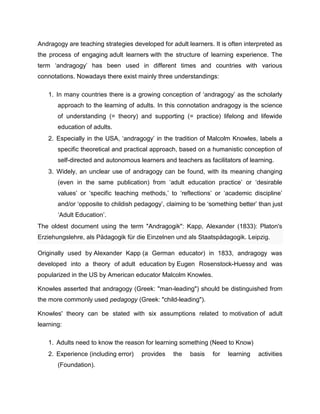
Andragogy
- 1. Andragogy are teaching strategies developed for adult learners. It is often interpreted as the process of engaging adult learners with the structure of learning experience. The term ‘andragogy’ has been used in different times and countries with various connotations. Nowadays there exist mainly three understandings: 1. In many countries there is a growing conception of ‘andragogy’ as the scholarly approach to the learning of adults. In this connotation andragogy is the science of understanding (= theory) and supporting (= practice) lifelong and lifewide education of adults. 2. Especially in the USA, ‘andragogy’ in the tradition of Malcolm Knowles, labels a specific theoretical and practical approach, based on a humanistic conception of self-directed and autonomous learners and teachers as facilitators of learning. 3. Widely, an unclear use of andragogy can be found, with its meaning changing (even in the same publication) from ‘adult education practice’ or ‘desirable values’ or ‘specific teaching methods,’ to ‘reflections’ or ‘academic discipline’ and/or ‘opposite to childish pedagogy’, claiming to be ‘something better’ than just ‘Adult Education’. The oldest document using the term "Andragogik": Kapp, Alexander (1833): Platon's Erziehungslehre, als Pädagogik für die Einzelnen und als Staatspädagogik. Leipzig. Originally used by Alexander Kapp (a German educator) in 1833, andragogy was developed into a theory of adult education by Eugen Rosenstock-Huessy and was popularized in the US by American educator Malcolm Knowles. Knowles asserted that andragogy (Greek: "man-leading") should be distinguished from the more commonly used pedagogy (Greek: "child-leading"). Knowles' theory can be stated with six assumptions related to motivation of adult learning: 1. Adults need to know the reason for learning something (Need to Know) 2. Experience (including error) provides the basis for learning activities (Foundation).
- 2. 3. Adults need to be responsible for their decisions on education; involvement in the planning and evaluation of their instruction (Self-concept). 4. Adults are most interested in learning subjects having immediate relevance to their work and/or personal lives (Readiness). 5. Adult learning is problem-centered rather than content-oriented (Orientation). 6. Adults respond better to internal versus external motivators (Motivation). The term has been used by some to allow discussion of contrast between self-directed and 'taught' education. Knowles collected ideas about a theory of adult education from the end of WWII until he was introduced to the term "andragogy." In 1966, Knowles met Dusan Savicevic in Boston. Savicevic shared the term andragogy with Knowles, and explained how it was used in the European context. In 1967, Knowles made use of the term "androgogy" to explain his theory of adult education. Then, after consulting Merriam-Webster, he corrected the spelling of the term to "andragogy" and continued to make use of the term to explain his collection of ideas about adult learning. (Sopher 2003)
